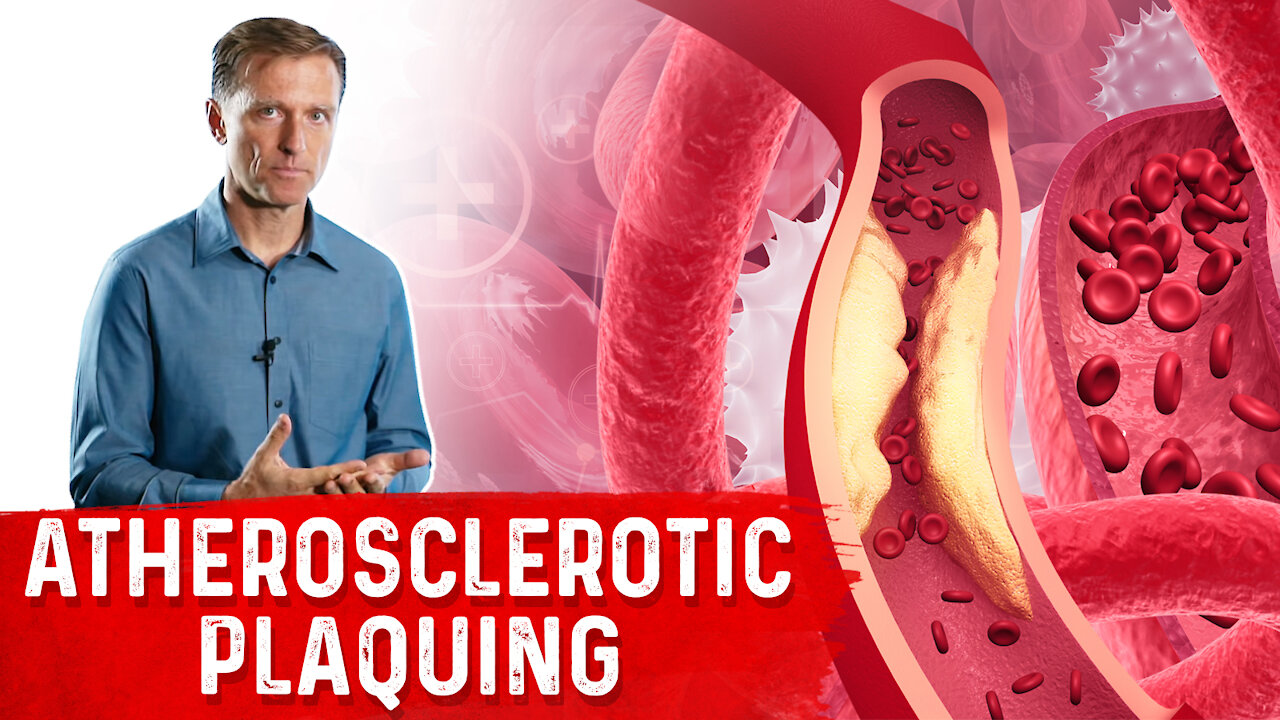Premium Only Content

Protocol for Calcified Plaque in Your Arteries
Talk to a Dr. Berg Keto Consultant today and get the help you need on your journey. Call 1-540-299-1556 with your questions about Keto, Intermittent Fasting or the use of Dr. Berg products. Consultants are available Monday through Friday from 8 am to 10 pm EST. Saturday & Sunday from 9 am to 6 pm EST. USA Only.
CAC test:
https://youtu.be/hXZjOXLyA2g
DATA:
Fan, Y.-Y., Ramos, K. S. & Chapkin, R. S. (1998) Combined dietary gamma-linolenic acid and n-3 polyunsaturated fatty acids retard atherosclerotic progression in ApoE knock out mice. In: Eicosanoids and Other Bioactive Lipids in Cancer, Inflammation and Related Diseases, Vol. 4 (Honn, K. V., Nigam, S., Marnett, L. J. & Dennis, E. eds.) (in press).
https://www.ahajournals.org/doi/full/10.1161/circulationaha.104.489534
https://www.ncbi.nlm.nih.gov/pmc/articles/PMC5228762/
https://www.ncbi.nlm.nih.gov/pmc/articles/PMC5088347/
https://www.ncbi.nlm.nih.gov/pmc/articles/PMC4170001/
Healthy Ketogenic Diet and Intermittent Fasting:
https://youtu.be/vMZfyEy_jpI
https://youtu.be/mBqpaAKtnXE
Check out this protocol for calcified plaque in your arteries.
Timestamps
0:00 Calcification in the arteries
0:47 What you could do for calcification in the arteries
Today I want to share a protocol to potentially help undo calcification in the arteries.
What you could do for calcification in the arteries:
1. Allicin
This is a phytonutrient in garlic. There is some interesting research on the association of allicin and decreased artery calcification in animals.
2. Butyrate
This is a compound that the microbes in the gut make when you feed them fiber (vegetable fiber). It’s a type of fat, a small-chain fatty acid. Butyrate has been associated with a decreased risk of artery disease.
3. Lycopene
This is a phytonutrient in certain vegetables. There is some interesting data showing how lycopene can decrease the thickness of the wall of the arteries and decrease the stiffness.
4. Omega-3 fatty acids
You can find this in cod liver oil or fish oils. Omega-3 fatty acids may help decrease inflammation.
5. GLA (gamma-linolenic acid)
This is a type of omega-6 fatty acid that is actually friendly to your arteries. A few examples would be borage oil, black currant seed oil, and evening primrose oil. GLA may help decrease inflammation, decrease the thickness of the arteries, and decrease plaque formation in the arteries.
6. Vitamin K2 (MK-7 version)
You may want to consider consuming 300mcg of vitamin K2 every day. Vitamin K2 can activate a certain protein that inhibits calcium from forming in the arteries.
7. Tocotrienols
This is one form of the vitamin E complex. Tocotrienols can greatly decrease inflammation in the arteries.
8. Decrease insulin resistance
Do whatever you can to decrease and reverse insulin resistance. There is a direct relationship between having insulin resistance and having calcification in the arteries. A lot of these other remedies may not work unless you also fix insulin resistance. You can help fix insulin resistance by doing the healthy keto diet and intermittent fasting.
The most important combination:
• Address insulin resistance
• Tocotrienols
• Vitamin K2
• Allicin
• Omega-3 fatty acids
Secondary:
• Butyrate
• Lycopene
• GLA
Dr. Eric Berg DC Bio:
Dr. Berg, age 55, is a chiropractor who specializes in Healthy Ketosis & Intermittent Fasting. He is the author of the best-selling book The Healthy Keto Plan, and is the Director of Dr. Berg Nutritionals. He no longer practices, but focuses on health education through social media.
Disclaimer:
Dr. Eric Berg received his Doctor of Chiropractic degree from Palmer College of Chiropractic in 1988. His use of “doctor” or “Dr.” in relation to himself solely refers to that degree. Dr. Berg is a licensed chiropractor in Virginia, California, and Louisiana, but he no longer practices chiropractic in any state and does not see patients so he can focus on educating people as a full time activity, yet he maintains an active license. This video is for general informational purposes only. It should not be used to self-diagnose and it is not a substitute for a medical exam, cure, treatment, diagnosis, and prescription or recommendation. It does not create a doctor-patient relationship between Dr. Berg and you. You should not make any change in your health regimen or diet before first consulting a physician and obtaining a medical exam, diagnosis, and recommendation. Always seek the advice of a physician or other qualified health provider with any questions you may have regarding a medical condition. The Health & Wellness, Dr. Berg Nutritionals and Dr. Eric Berg, D.C. are not liable or responsible for any advice, course of treatment, diagnosis or any other information, services or product you obtain through this video or site.
Thanks for watching! I hope this helps you better understand what you can do if you have calcified plaque in your arteries.
-
 6:38
6:38
Dr. Eric Berg
1 day agoThe Shocking Truth About Vaccines
5.13K49 -
 2:39
2:39
Judoboy1
4 years ago $0.01 earnedFormula 4 Protocol Testimonials
53 -
 2:58
2:58
KJRH
5 years agoBack-to-School safety protocol
19 -
 5:54
5:54
Human Temperature Reduction
4 years ago $0.37 earnedHeat Stroke Treatment Protocol
690 -
 1:38
1:38
KSHB
4 years agoJohnson County commission passes COVID-19 protocol enforcement
1031 -
 1:20
1:20
KGUN
5 years agoCOVID-19 protocol in place for Primary Election Day
35 -
 2:00
2:00
KGUN
4 years agoVUSD enacts strict safety protocol ahead of hybrid learning
5 -
 0:34
0:34
KTNV
4 years agoPlanet Protocol helps NASA discover new planets
102 -
 2:09
2:09
WEWS
5 years agoSalons reopen throughout Ohio with intense safety protocol
5 -
 LIVE
LIVE
Welcome to the Rebellion Podcast
19 hours agoMonday Funday - WTTR Podcast Live 8/25
306 watching